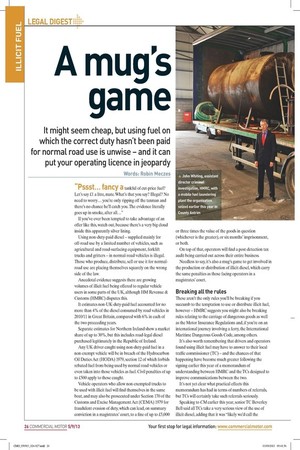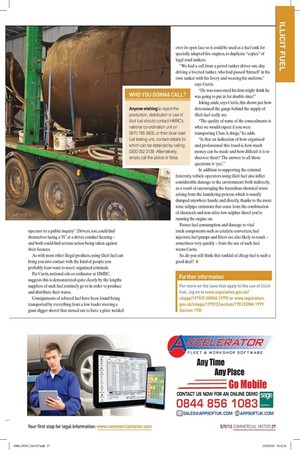A mug's game It might seem cheap, but using fuel
Page 20

Page 21

If you've noticed an error in this article please click here to report it so we can fix it.
on which the correct duty hasn't been paid for normal road use is unwise and it can put your operating licence in jeopardy Words: Robin Meczes
"Pssst... fancy a tankful of cut-price fuel? Let's say £1 a litre, mate. What's that you say? Illegal? No need to worry... you're only ripping off the taxman and there's no chance he'll catch you. The evidence literally goes up in smoke, after all..."
If you've ever been tempted to take advantage of an offer like this, watch out, because there's a very big cloud inside this apparently silver lining.
Using non-duty-paid diesel — supplied mainly for off-road use by a limited number of vehicles, such as agricultural and road-surfacing equipment, forklift trucks and gritters — in normal-road vehicles is illegal. Those who produce, distribute, sell or use it for normalroad use are placing themselves squarely on the wrong side of the law.
Anecdotal evidence suggests there are growing volumes of illicit fuel being offered to regular vehicle users in some parts of the UK, although HM Revenue & Customs (HMRC) disputes this.
It estimates non-UK-duty-paid fuel accounted for no more than 4% of the diesel consumed by road vehicles in 2010/11 in Great Britain, compared with 6% in each of the two preceeding years.
Separate estimates for Northern Ireland show a market share of up to 30%, but this includes road-legal diesel purchased legitimately in the Republic of Ireland.
Any UK driver caught using non-duty-paid fuel in a non-exempt vehicle will be in breach of the Hydrocarbon Oil Duties Act (HODA) 1979, section 12 of which forbids rebated fuel from being used by normal road vehicles or even taken into those vehicles as fuel. Civil penalties of up to £500 apply to those caught. Vehicle operators who allow non-exempted trucks to be used with illicit fuel will find themselves in the same boat, and may also be prosecuted under Section 170 of the Customs and Excise Management Act (CEMA) 1979 for fraudulent evasion of duty, which can lead, on summary conviction in a magistrates' court, to a fine of up to £5,000
or three times the value of the goods in question (whichever is the greater), or six months' imprisonment, or both.
On top of that, operators will find a post-detection tax audit being carried out across their entire business.
Needless to say, it's also a mug's game to get involved in the production or distribution of illicit diesel, which carry the same penalties as those facing operators in a magistrates' court. Breaking all the rules
These aren't the only rules you'll be breaking if you succumb to the temptation to use or distribute illicit fuel, however — HMRC suggests you might also be breaking rules relating to the carriage of dangerous goods as well as the Motor Insurance Regulations and, if you're on an international journey involving a ferry, the International Maritime Dangerous Goods Code, among others.
It's also worth remembering that drivers and operators found using illicit fuel may have to answer to their local traffic commissioner (TC) — and the chances of that happening have become much greater following the signing earlier this year of a memorandum of understanding between HMRC and the TCs designed to improve communications between the two.
It's not yet clear what practical effects this memorandum has had in terms of numbers of referrals, but TCs will certainly take such referrals seriously. Speaking to CM earlier this year, senior TC Beverley Bell said all TCs take a very serious view of the use of illicit diesel, adding that it was "likely we'd call the
operator to a public inquiry". Drivers, too, could find themselves facing a TC at a driver conduct hearing — and both could find serious action being taken against their licences.
As with most other illegal products, using illicit fuel can bring you into contact with the kind of people you probably least want to meet: organised criminals.
Pat Curtis, national oils co-ordinator at HMRC, suggests this is demonstrated quite clearly by the lengths suppliers of such fuel routinely go to in order to produce and distribute their wares. Consignments of rebated fuel have been found being transported by everything from a low loader moving a giant digger shovel that turned out to have a plate welded
over its open face so it could be used as a fuel tank for specially adapted fire engines, to duplicate "copies" of legal road tankers. "We had a call from a petrol tanker driver one day driving a liveried tanker, who had passed 'himself' in his own tanker with his livery and wearing his uniform,"
says Curtis.
"He was concerned his firm might think he was going to put in for double-time!"
Joking aside, says Curtis, this shows just how determined the gangs behind the supply of illicit fuel really are.
"The quality of some of the concealments is what we would expect if you were transporting Class A drugs," he adds.
"Is that an indication of how organised and professional this fraud is, how much money can be made and how difficult it is to discover them? The answer to all those questions is 'yes'." In addition to supporting the criminal
fraternity, vehicle operators using illicit fuel also inflict considerable damage to the environment: both indirectly, as a result of encouraging the hazardous chemical waste arising from the laundering process, which is usually dumped anywhere handy; and directly, thanks to the more toxic tailpipe emissions that come from the combination of chemicals and non-ultra-low sulphur diesel you're running the engine on.
Poorer fuel consumption and damage to vital truck components such as catalytic converters, fuel injectors, fuel pumps and filters are also likely to result — sometimes very quickly — from the use of such fuel, warns Curtis. So, do you still think that tankful of cheap fuel is such a good deal? •
WHO YOU GONNA CALL?
Anyone wishing to report the production, distribution or use of illicit fuel should contact HMRC's national co-ordination unit on 0870 785 3600, or their local road fuel testing unit, contact details for which can be obtained by calling 0300 052 3139. Alternatively, simply call the police or Vosa. Further information For more on the laws that apply to the use of illicit fuel, log on to www.legislation.gov.uk/ ukpga/1979/5 (HODA 1979) or www.legislation. gov.uk/ukpga/1979/2/section/170 (CEMA 1979 Section 170)









































